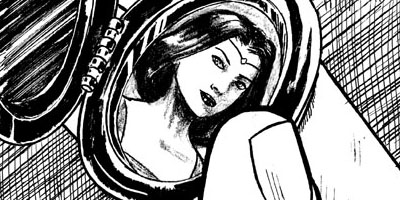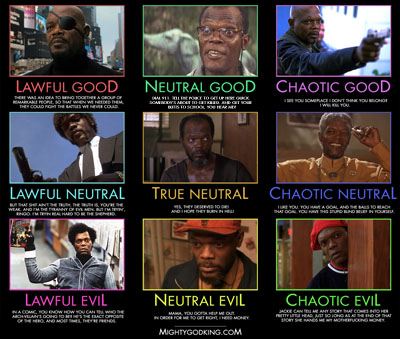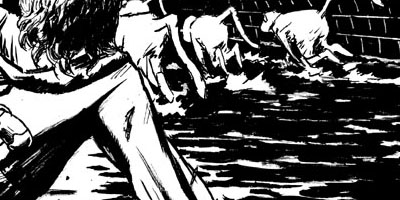My weekly TV column is up at Torontoist.
9
Jul
because “Condoleezza Rice: The Series” was just depressing
Posted by MGK Published in The Internets, TV9
Jul
5
Jul
4
Jul
The Old Order Changeth!
Posted by Jim Smith Published in Comics, General Nerd Crap, Interactive Fun Time PartyIt’s way too early to figure out what Marvel’s going to be doing with it’s “Marvel Now!” relaunch, but one thing that seems clear is that Jonathan Hickman is going to be writing a bimonthly Avengers series that will feature a roster of 18 (or more!) heroes. Eighteen sounds like a lot, but I suppose it’s understandable. Historically there were something like 70 different members of the Avengers before Bendis took over in 2004, and then he promptly added about a hillion jillion more guys. (Red Hulk? Seriously?) At this point the Avengers are like the Legion of Super-Heroes; it’s pretty difficult to pick just seven or eight people that’d please everybody.
Right now I can only guess which heroes Hickman will pick for his team–the only confirmed selection is Shang-Chi, Master of Kung Fu. But seeing as I’m pretty picky with who ought and ought not to be an Avenger, I figured I could pass the time by making my own list of people. And I thought we could make a game of it, oh boy!
I have a fairly limited sense of who should be an Avenger. I’ve never been thrilled with Spider-Man, Daredevil, or Wolverine being on the team, simply because those characters function best as loners or outcasts or reluctant allies. As soon as those guys are on the five o’clock news attending a press conference with Captain America and Iron Man, everything that makes them unique ceases to make any sense. An Avenger can be a misfit, but only about as far as Hawkeye or Moondragon, so that they still make some sense being on a team of professional, public superheroes. (I give a pass to the Hulk, seeing as he’s a founding member. But I think that backs up my position–who needs Wolverine or Sentry or Ares to be the “badder bad boy” of the team when you have the Incredible Hulk?) In general I’ve never been a big fan of “improving” the Avengers by replacing them with something else–either by dumping the casts of other comics directly into the roster, or by insisting that they have to resemble the Justice League.
To me the best Avengers are the ones which feel like the best at what they do, who can gel well with the team, and that have or could easily serve with on the team for years. They should be professionals willing to endure public exposure–reclusive vigilantes and overly angsty trainwrecks need not apply. I also prefer characters who don’t make me feel like I picked up the wrong comic book by mistake–one of the Eternals hanging around is fine, but half of the Defenders is pushing it.
With all that in mind, here are the 18 characters I’d use if I was writing Avengers in 2012:
- Captain America
- Thor
- Iron Man
- Hawkeye
- The Black Widow
- The Hulk
- The Vision
- The Scarlet Witch
- The Black Panther
- Storm
- The Wasp
- The Black Knight
- Excalibur (Faiza Hussain)
- Captain Marvel (Carol Danvers)
- Tigra
- Shang-Chi
- Living Lightning
- Amadeus Cho
Wow, that was harder than I thought–several of my favorites got left out. But I think it’s a good mix of icons, underutilized mainstays, and a couple of newer faces.
Anyway, I know you think you can do better, so post your dream team of Avengers in the comments. Pick anybody you want (as long as Marvel owns them) and as many as you want, up to 18. In about a week or so I’ll do a follow-up post listing the 18 characters who got the most votes. Obviously that list will be THE UNIDSPUTED RIGHT ANSWER, and we can send it in to Marvel and get paid for figuring it out for them.
3
Jul
Numerous incremental improvements over the Tobey Maguire edition of the franchise (better actors, Spider-Man gets to say some actual wisecracks, somewhat more intelligent plot) don’t quite keep one from noticing the fact that you are watching, first and foremost, product.
3
Jul
The thing about biographical movies is that for the actors playing people who were actual Real People In History, and particularly for recent Real People, there is a fine line you have to walk between “this is who that person sounded like” and “this is who that person actually was.” People become famous for their verbal tics and how they generally hold themselves, but that’s not who they were, not when you get right down to it. Any person is infinitely more complex than their public persona, and a good actor works to capture the person’s interior life (as best they are able) and use that to bring out the public side of things.
Or they just say “fuck it” and go one way or the other.

Anthony Hopkins’ performance in Nixon is a good example of the second choice. It’s an amazing performance, all the moreso because Hopkins looks and sounds nothing like Richard Nixon. (This is all the more notable because Dan Hedaya shows up briefly in the film, and Hedaya’s similarity to Nixon is so pronounced it eventually led to him being cast as Nixon in the underrated comedy Dick.) Hopkins doesn’t bother trying to imitate Nixon because there wouldn’t be any point. Even his Welsh accent keeps cropping up in Nixon’s famous lines.
However, about twenty minutes into Nixon, something remarkable happens: you just forget about Hopkins being not-Nixon and instead completely buy into him as Nixon. It happens because Anthony Hopkins is a fucking great actor and concentrates on the driving forces that animated Nixon – he gets at the core of Nixon’s incredible sense of resentment that drove him, but also Nixon’s sense of superiority at the same time. But Hopkins’ Nixon is resolutely human rather than simply a one-dimensional monster. Hopkins’ Nixon doesn’t just seek dominance but approval: the scene where Nixon tries to engage with the protestors at the Lincoln Memorial is framed by Stone as simply tragic, a microcosm of the larger tragedy that was Nixon’s wasted potential (one of the smartest Presidents ever, but see what use that intelligence went to); his sense of superiority is driven at least in part by his strong sense of loyalty (he is resolutely faithful to his wife). Hopkins’ Nixon is flawed, but sympathetic, and to make Nixon a sympathetic figure rather than a devil is the stronger artistic choice.
Of course, Hopkins is backed up by a fucking murderer’s row of acting talent: Joan Allen, James Woods, Powers Boothe, Paul Sorvino, Ed Harris, Bob Hoskins, David Hyde Pierce, and J.T. Walsh as, respectively, Pat Nixon, Bob Haldeman, Alexander Haig, Henry Kissinger, E. Howard Hunt, J. Edgar Hoover, John Dean and John Erlichman. But wait: there is more: David Paymer, Kevin Dunn, Mary Steenburgen, Saul Rubinek, Madeline Kahn, Edward Herrman – even John C. McGinley makes an appearance at the top of the film in a fake “school career” educational film. (Don’t ask me to explain why Stone decided that had to be in there. It’s metaphorical somehow, though, you can be sure of that. Still, Oliver Stone is inscrutable.) Interestingly, most of these actors go more to the “impersonation” school than Hopkins does (Sorvino’s Kissinger is particularly dead-on), but that choice actually grounds Hopkins’ method – by surrounding him with actors doing more faithful interpretations of the people they’re portraying, his un-Nixon Nixon gradually becomes “real” because he’s constantly interacting with more genuine-ish articles.
But ultimately Nixon is about a man’s relationship with power – it is not for nothing that Stone (who is not a subtle person, really) begins by quoting the Bible (“what hath a man gained, if he hath lost his soul?”) and then spends twenty minutes exploring Nixon’s horrible, horrible childhood and his horrible parents who didn’t love him and how this forged Nixon into a man who resented those who were loved (Kennedy more than anybody) and envied that love and was never sure if he had it – not even from his wife – and so sought power above all. It’s a far more entertaining trip to the dark side than George Lucas ever envisioned (and yes, of course Lucas wrote Star Wars with Nixon metaphors firmly in mind) and far more complex and realized. When Stone directed W., he made George W. Bush out to be a pawn in other people’s games; Stone’s Nixon, on the other hand, knows exactly what he’s playing and why.
3
Jul
My weekly TV column is up at Torontoist.
2
Jul
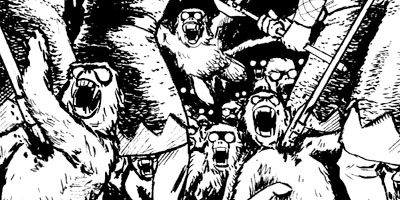
And that is four issues in the can.
(Yes, I know we should get a proper dedicated site for this. It is on my to-do list. There is a whole other ongoing comic I want to do as well, but… there are only so many hours in the day, you see. If I ever win the lotto, though, I expect my productivity to go through the roof with respect to everything that is fun.)
29
Jun
Who doesn’t love ‘Mars Attacks’?
OK, a lot of people, actually. The film barely rates above 50% on Rotten Tomatoes, and the people who hate it seem to hate it with a passion even stronger than the people who liked it. Something about the film doesn’t just distance people from it, it outright infuriates them. The movie was a box office disappointment that barely made back its production budget, and even though it won some awards, it’s a film that never seems to be trying to win over its critics. In fact, I’d argue (actually, I’m about to argue) that this was part of the internal logic of the film. Burton isn’t just satirizing the tropes of a Hollywood blockbuster in the way that Zucker and Abrams might; he’s satirizing the entire idea of the tentpole summer movie. And whether you love it or hate it, you have to admit, he did his job perfectly.
For those of you who haven’t seen ‘Mars Attacks’, it’s a pretty straightforward plot; aliens from Mars arrive on Earth, and while the early portion of the film is taken up with speculation about the motives of our first extraterrestrial visitors, they make their intentions clear pretty fast: They’re assholes. They come to loot, pillage, murder and destroy, seemingly for no reason other than the sheer manic joy of it (“seemingly” because they speak only in repeated, seal-like barks that they translate themselves with…questionable reliability. “DO.NOT.RUN! WE.ARE.YOUR.FRIENDS!” the translation machine barks out, as the Martians holding it gun down anyone foolish enough to stop.) Various characters flee, fight, or hide from the Martians, until just by chance, the plucky hero of the film discovers their secret weakness. Once it’s used on them, the alien menace is easily defeated. (For the benefit of those who haven’t seen the film, I won’t spoil the Martians’ secret weakness. It’s a great gag, though.)
The plot isn’t just straightforward, though. It’s downright generic. It’s every alien invasion flick, half the disaster movies out there, and a good chunk of the horror films. On paper, this sounds just like the kind of brainless popcorn flick we’re supposed to go out to the multiplex and see on opening weekend. Even the list of actors doesn’t give away the game; Jack Nicholson, Pierce Brosnan, Natalie Portman, Sarah Jessica Parker, Glenn Close, Lukas Haas…really, the only overt comic actors in the whole film are Martin Short and Jack Black, and they’ve got bit parts (and this was before Jack Black made it big.) To the untrained eye, this looks and sounds like a major Hollywood movie.
But when you watch it, you become aware of a peculiar alchemy. Nothing about this film is accessible. The concept is based on osbcure trading cards from the 1950s. The White House scenes play like something out of ‘Doctor Strangelove’ instead of ‘Independence Day’. The scenes of destruction are played for black comedy instead of shock and awe. Natalie Portman and Lukas Haas, the obvious romantic pairing, barely even speak to each other; most of the romance in the film comes from Sarah Jessica Parker’s head on a chihuahua’s body confessing her undying love to a bodiless Pierce Brosnan. The President isn’t an action hero; he isn’t even a wise mentor. He gets killed by a novelty joke handshake (in what may be a parody of a previous Burton/Nicholson sequence.) The use of nuclear weapons, played for drama for most of the film, is turned into a stoner gag. Every classic trope that we’ve come to expect is turned into an in-joke so strange and obscure that it becomes obvious, at some point, that we’re not supposed to get it. The film turns “blockbuster” into “cult” and pushes the limits even of that. The message of ‘Mars Attacks’, which hits you somewhere around the halfway point, is Tim Burton saying, “Can you actually believe that someone gave me this much money just to make a motion picture?”
Burton isn’t just satirizing the elements of a summer blockbuster, he’s satirizing the need for one. He has taken what is meant to be the most generic possible genre of film and made something intensely personal, something that only he could love (although he’s obviously willing to let other people go along for the ride if they’re willing to come on his terms.) It’s a savagely brilliant indictment of the lowest common denominator, as expressed through brain-headed guys blowing up the Taj Mahal after they take their pictures in front of it…and when you look at it like that, is it really any surprise that it wasn’t popular?
27
Jun
I asked this on Twitter and got a lot of responses so I thought I’d double it up here: what do you folks think are the most readable “great books” of literature? My counter-example here is Moby Dick – yes, it’s a Great Novel that explores its themes deeply and expertly, but it’s also a boring slog of a read filled with long technical discussions of whaling that are painful to work through, like if Tom Clancy was really, really into whaling or something.
Popular responses to the question on Twitter included The Great Gatsby, To Kill a Mockingbird and The Three Musketeers, but both Gatsby and Mockingbird feel kind of like cheats to me because they’re both so recent and therefore more in tune with modern audiences’ experience of reading. But still, I am throwing it out there.
27
Jun
Five Potential Partnerships (So Crazy They Might Just Work)
Posted by John Seavey Published in Comics, General Nerd Crap, General Nerd ShitThere’s always something fun about the quirky, organic partnerships that grow up between two characters in comics. Sometimes they’re done for mercenary reasons, like the need to combine two low-selling books into one moderate-selling title (like, say, slapping together a martial artist from the lost realm of K’un L’un and a street-smart super-strong hero for hire.) Sometimes they’re the result of a writer that decides the two characters fit together, and who does such a good job of selling it that the two become inextricably linked (like, say, an impossibly erudite blue-furred mutant and a self-doubting titan of strength and invulnerability.) Whether you love Blue Beetle and Booster Gold, Green Arrow and Green Lantern, or Black Canary and Oracle, those unplanned pairings are part of the fun of comics. And since there are a few characters floating around in the wake of recent cancellations, I thought I’d suggest some places for DC and Marvel to put them before they get around to killing them off.
1) Blue Beetle and Static. Both of these characters have a lot in common. They’re both fairly well-known to non-comics fans through other media (the ‘Brave and the Bold’ cartoon, the ‘Static Shock’ cartoon), but have never quite found enough of an audience in comics to sustain them long term. They’re both young men trying to learn how to be heroes. They’re both ethnically diverse in a comics universe that still has problems with that. The two of them could very well make a team that makes people forget Ted and Booster.
2) X-23 and the Winter Soldier. Two former killers, each trying to redeem their troubled pasts. Both of them are at the same time worldly-wise and strangers to real life. Both of them are the kind of badasses that comics fans gravitate to. It’d be interesting to see the original Bucky trying to take on a mentor role, especially when he doesn’t feel like he necessarily knows himself enough to strike out on his own.
3) Mister Terrific and Grifter. One of them has a plan for everything, the other can barely figure out where his next paycheck is coming from. One of them is a super-genius, the other is a killing machine. One of them needs the other’s help…but which one?
4) Daken and Deadpool. Let’s face it, if there is one creation that has completely and totally flopped, it’s “Dark Wolverine”. The concept of an emo teenage Wolverine with daddy issues practically screams, “Hate me!” and none of the stories he’s appeared in have ever shaken that notion. So why not make him the butt of Deadpool’s jokes? A Looney Toons-style romp between two characters whose healing factors make them unkillable, one of whom is utterly insane and the other of whom makes the perfect straight man could be the first Daken comic actually worth reading.
5) Ghost Rider and Doctor Strange. Actually, how has this not happened already? I mean, you’ve got the Sorcerer Supreme and a guy struggling to keep a demon contained within his body. Doc Strange has a habit of gathering together misfits and outcasts and making teams out of them, and Johnny Blaze clearly needs a mystic mentor. This just feels like something that should have been done ages ago.
Any partnerships you’d like to see becoming the next World’s Finest? Share ’em in the comments!
26
Jun
All The Archies In The Improved World
Posted by MGK Published in Archie (Improved Or Otherwise), Comics, Interactive Fun Time Party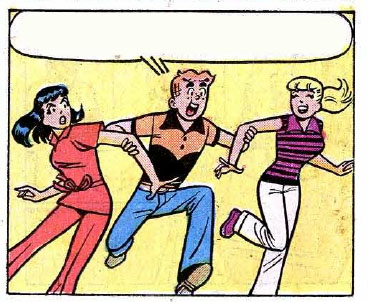
25
Jun
My weekly TV column is up at Torontoist.
25
Jun
Search
"[O]ne of the funniest bloggers on the planet... I only wish he updated more."
-- Popcrunch.com
"By MightyGodKing, we mean sexiest blog in western civilization."
-- Jenn
Contact
MGKontributors
The Big Board
MGKlassics

Blogroll
- ‘Aqoul
- 4th Letter
- Andrew Wheeler
- Balloon Juice
- Basic Instructions
- Blog@Newsarama
- Cat and Girl
- Chris Butcher
- Colby File
- Comics Should Be Good!
- Creekside
- Dave’s Long Box
- Dead Things On Sticks
- Digby
- Enjoy Every Sandwich
- Ezra Klein
- Fafblog
- Galloping Beaver
- Garth Turner
- House To Astonish
- Howling Curmudgeons
- James Berardinelli
- John Seavey
- Journalista
- Kash Mansori
- Ken Levine
- Kevin Church
- Kevin Drum
- Kung Fu Monkey
- Lawyers, Guns and Money
- Leonard Pierce
- Letterboxd – Christopher Bird - Letterboxd – Christopher Bird
- Little Dee
- Mark Kleiman
- Marmaduke Explained
- My Blahg
- Nobody Scores!
- Norman Wilner
- Nunc Scio
- Obsidian Wings
- Occasional Superheroine
- Pajiba!
- Paul Wells
- Penny Arcade
- Perry Bible Fellowship
- Plastikgyrl
- POGGE
- Progressive Ruin
- sayitwithpie
- scans_daily
- Scary-Go-Round
- Scott Tribe
- Tangible.ca
- The Big Picture
- The Bloggess
- The Comics Reporter
- The Cunning Realist
- The ISB
- The Non-Adventures of Wonderella
- The Savage Critics
- The Superest
- The X-Axis
- Torontoist.com
- Very Good Taste
- We The Robots
- XKCD
- Yirmumah!
Donate
Archives
- August 2023
- May 2022
- January 2022
- May 2021
- January 2021
- December 2020
- October 2020
- June 2020
- March 2020
- January 2020
- December 2019
- October 2019
- February 2019
- January 2019
- December 2018
- April 2018
- March 2018
- February 2018
- January 2018
- December 2017
- November 2017
- October 2017
- February 2017
- January 2017
- December 2016
- November 2016
- October 2016
- September 2016
- August 2016
- July 2016
- June 2016
- May 2016
- April 2016
- March 2016
- February 2016
- January 2016
- December 2015
- November 2015
- October 2015
- September 2015
- August 2015
- July 2015
- June 2015
- May 2015
- April 2015
- March 2015
- February 2015
- January 2015
- December 2014
- November 2014
- October 2014
- September 2014
- August 2014
- July 2014
- June 2014
- May 2014
- April 2014
- March 2014
- February 2014
- January 2014
- December 2013
- November 2013
- October 2013
- September 2013
- August 2013
- July 2013
- June 2013
- May 2013
- April 2013
- March 2013
- February 2013
- January 2013
- December 2012
- November 2012
- October 2012
- September 2012
- August 2012
- July 2012
- June 2012
- May 2012
- April 2012
- March 2012
- February 2012
- January 2012
- December 2011
- November 2011
- October 2011
- September 2011
- August 2011
- July 2011
- June 2011
- May 2011
- April 2011
- March 2011
- February 2011
- January 2011
- December 2010
- November 2010
- October 2010
- September 2010
- August 2010
- July 2010
- June 2010
- May 2010
- April 2010
- March 2010
- February 2010
- January 2010
- December 2009
- November 2009
- October 2009
- September 2009
- August 2009
- July 2009
- June 2009
- May 2009
- April 2009
- March 2009
- February 2009
- January 2009
- December 2008
- November 2008
- October 2008
- September 2008
- August 2008
- July 2008
- June 2008
- May 2008
- April 2008
- March 2008
- February 2008
- January 2008
- December 2007
- November 2007
- October 2007
- September 2007
- August 2007
- July 2007
- February 2007
Tweet Machine
- No Tweets Available
Recent Posts
- Server maintenance for https
- CALL FOR VOTES: the 2021 rec.sport.pro-wrestling Awards
- CALL FOR NOMINATIONS: The 2021 rec.sport.pro-wrestling Awards (the Theszies)
- The 2020 RSPW Awards – RESULTS
- CALL FOR VOTES: the 2020 Theszies (rec.sport.pro-wrestling Awards)
- CALL FOR NOMINATIONS: The 2020 Theszies (rec.sport.pro-wrestling awards)
- given today’s news
- If you can Schumacher it there you can Schumacher it anywhere
- The 2019 RSPW Awards – RESULTS
- CALL FOR VOTES – The 2019 RSPW Awards (The Theszies)
Recent Comments
- Harley in Thursday WHO'S WHO: Tim Trench
- George Leonard in When Pogo Met Simple J. Malarkey
- Blob in How Jason Todd Went Wrong A Second Time
- Cindi Chesser in Thursday WHO'S WHO: The War Wheel
- Scott Hater in Bing, Bang, Bing, Fuck Off
- dan loz in Hey, remember how we talked a while a back about b…
- Sean in Server maintenance for https
- Ethan in CALL FOR VOTES: the 2021 rec.sport.pro-wrestling A…
- wyrmsine in ALIGNMENT CHART! Search Engines
- Jeff in CALL FOR VOTES: the 2021 rec.sport.pro-wrestling A…
